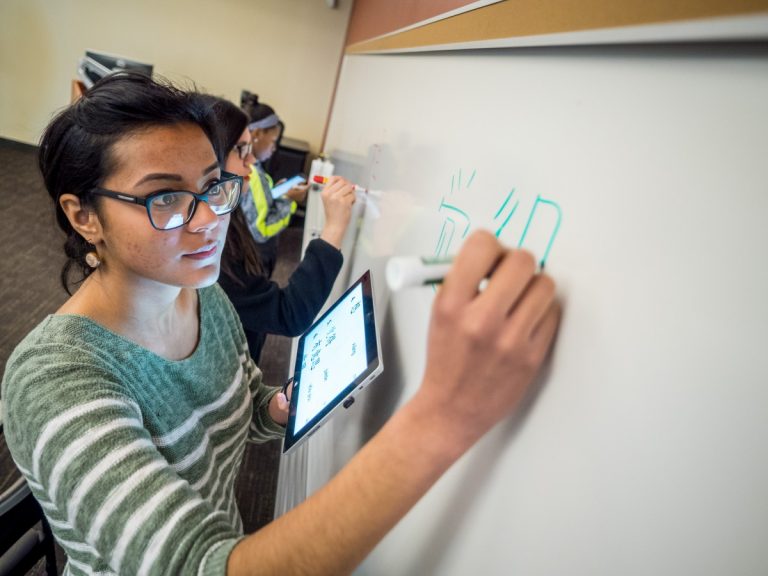
“If you talk to a man in a language he understands, that goes to his head. If you talk to him in his language, that goes to his heart.” ‒ Nelson Mandela
Language learning was once considered nothing more than a hobby, but as the world continues to become increasingly connected, learning a language other than English is considered a necessity. Advancing technologies have afforded us the ability to communicate no matter where we are in the world, amplifying the importance of foreign language study.
The great thing about languages is that, other than being a form of communication, they also serve as a means of relating to others on a cultural level.
“Language conveys information, but it also connects cultures,” explains Robert Friedman, Dean of the College of Humanities and Social Sciences at Montclair State University.
“The more familiar one is with languages, the easier it is to understand the cultural contexts that shape the information, ideas, beliefs and customs that one encounters when interacting with people throughout the world,” he adds.
In a globalized world, those who speak multiple languages – particularly Spanish, Mandarin or Arabic – have a much better chance of finding meaningful employment. According to Inside Higher Ed, the ability to speak a modern language gives graduates a competitive edge over others as the demand for bilingual workers in the US continues to rise.

Image courtesy of Montclair State University
And as more business leaders and corporations reach out to global audiences and markets, the importance of knowing another language comes in handy for graduates seeking a job. Many organizations need individuals who can work in a culturally diverse environment but also boast strong skills in a modern foreign language.
The ability to speak the same language as your clients helps build a strong rapport, often resulting in longer-lasting business partnerships. “While English may open doors because it’s the lingua franca of international business, a confident command of other languages will help to close deals,” the Dean says.
Although English remains the ‘universal language’ of the world, the emergence of developing economies such as Brazil, Russia, China, India, South Korea and Saudi Arabia has encouraged more students to study a new language to prepare them for future success.
“Corporations continue to expand their markets beyond borders, so advanced language skills are valuable in sales, marketing, supply chain management or any position that supports the sustainability of a commercial operation,” explains Dean Friedman.
For prospective students looking to pursue language study to boost future career options, the College of Humanities and Social Sciences at Montclair State University offers a wide range of courses that not only instil the necessary language expertise, but also explore the history and culture of each distinctive language.

Image courtesy of Montclair State University
Students can choose from a wide range of language programs that include Arabic, Chinese, French, Spanish, Italian, Portuguese, German and Russian. The institution also provides language clubs, held in an informal setting for speaking and interacting in the target language. Previous activities have involved group trips to restaurants, museums, operas and plays in New York City.
The Department of Modern Languages and Literatures helps students achieve their study goals, whether they lie in teaching, international business, diplomacy or entertainment purposes. Here, students are taught by a Faculty that is well-known for teaching excellence, as well as a commitment to the progress of each individual through extra-curricular activities and novel teaching designs.
You’ll be taught by a group of reputable scholars who are leading experts in their respective subject disciplines. According to Dean Friedman, members of Faculty are regularly invited to speak at international and US conferences, while many have been recipients of foundation awards. “Some are on editorial boards of significant journals in their areas of study and all present their research at juried conferences on a regular basis.”
Located in New Jersey, Montclair State University is the second-largest public university in the state. Its setting, lying just 12-miles from the bustle of Manhattan, makes it an attractive option for students around the world. With its location in one of the most densely populated states in the US, Montclair State students benefit from the unique opportunity to meet and interact with other international pupils within the community, allowing them to bolster their language expertise as they expose themselves to a brand-new culture and heritage.
“The United States is a nation of immigrants, and its institutions of higher learning have developed an atmosphere that celebrates the diversity of cultures in its student and faculty populations,” the Dean explains. “Thousands of students travel to study in the U.S. because of the instructional excellence provided here.”
And with two train stations and two bus lines on campus, you can easily make your way to the Big Apple and enjoy everything this city has to offer. Part of what makes this institution so appealing as a language study destination is its multicultural community and environment, both within the classroom setting and further out into the big city.

Image courtesy of Montclair State University
Finding the right institution to study language can be daunting, but as long as you follow the right criteria you will be just fine. As Dean Friedman notes, the first things to identify are the areas of knowledge and expertise you hope to gain from the program, then narrow your choices down to the ones that perfectly match your interests.
“Start by researching the credentials of the faculty who will be your instructors. Look for evidence of teaching excellence [and] what current students have to say about their professors,” says Dean Friedman.
“…In addition to researching your program, if you’re coming from far away, you’ll probably want to experience as much local culture as you possibly can. Proximity to cities – with their cultural venues, arts and social activity – may be on your wish list; Montclair State can satisfy that,” the Dean concludes.
“Access to beaches, mountains and parks may also be something you desire. Montclair State is less than a two-hour drive from the famous Jersey Shore beaches, and an even shorter trip to a variety of ski areas. Boating, fishing, sports of all kinds – it’s all here in New Jersey.”
Follow Montclair State University on Facebook, Twitter and YouTube
Liked this? Then you’ll love these…
The impact of the English Language in an interconnected world
Institute of Arts and Humanities: Live and learn in an exceptional environment







